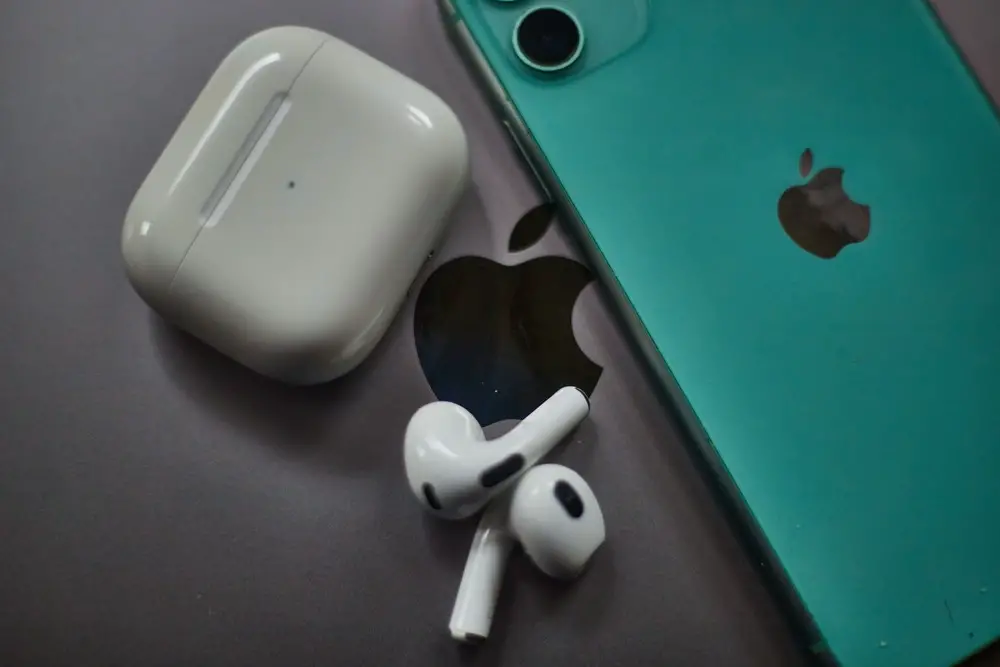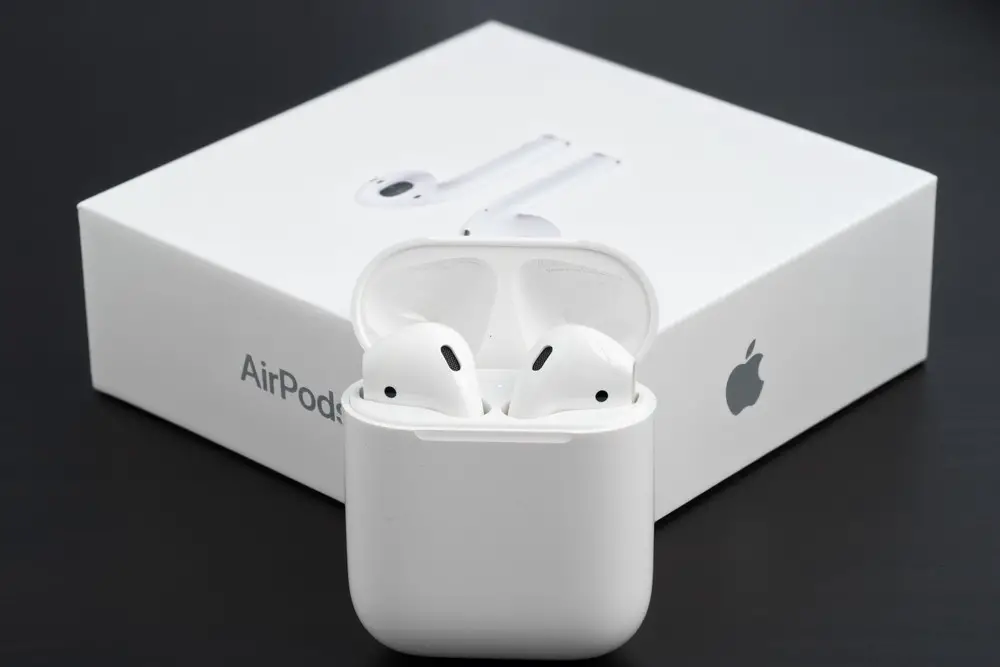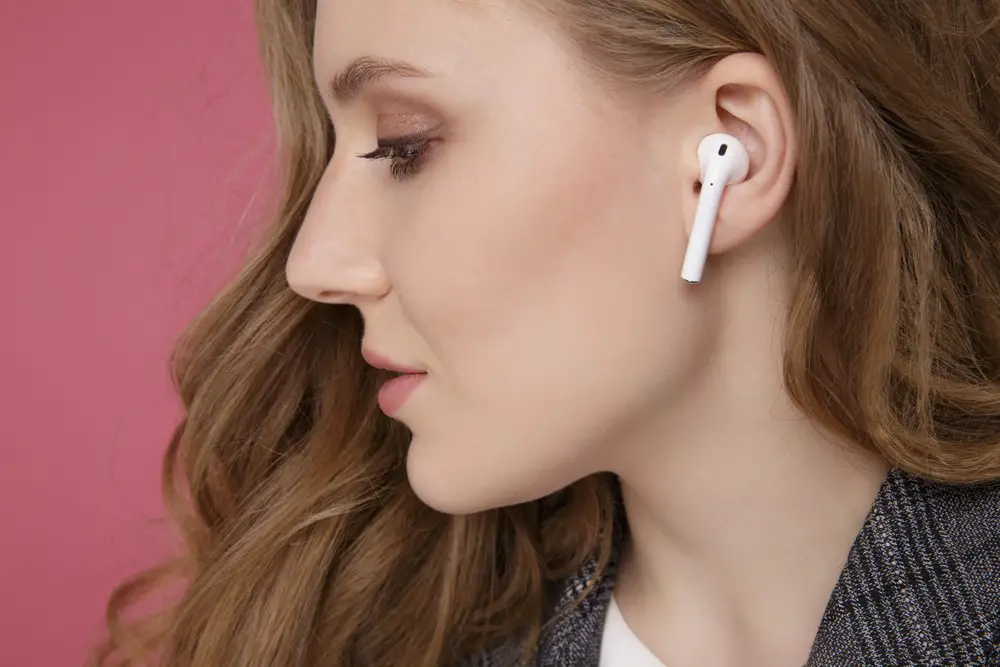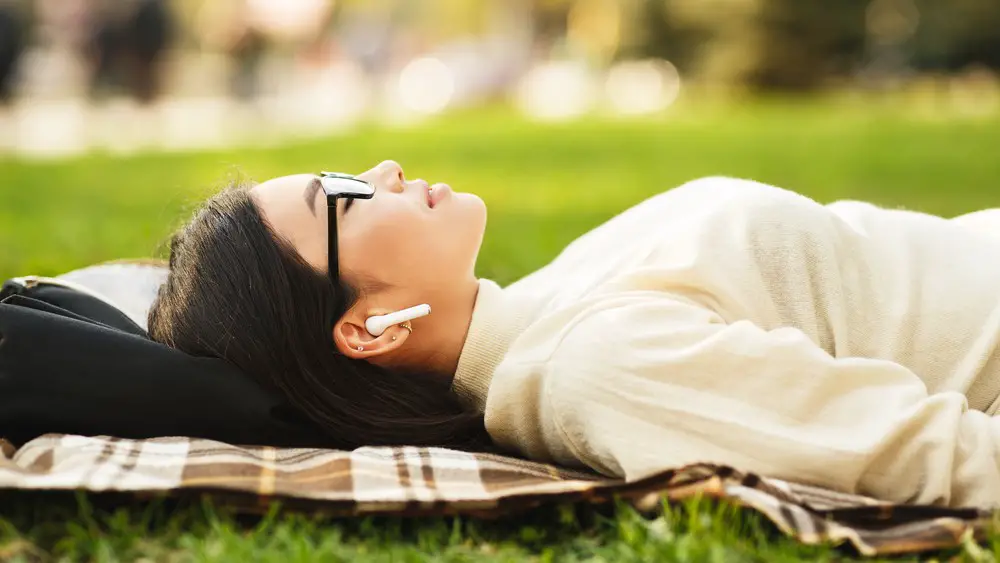As a BetterHelp affiliate, we receive compensation from BetterHelp if you purchase products or services through the links provided
When AirPods were released in 2016, they revolutionized how we consume music and other audio content. But is it safe to sleep with them in? As convenient as they may be, sleeping with AirPods can have serious health implications that should not be overlooked. In this article, we will discuss the potential risks associated with wearing AirPods while sleeping and provide recommendations on using them safely. Read on to learn more about the potential health risks of sleeping with AirPods in.
Safety of Sleeping with Airpods
Potential Infections
Sleeping with AirPods in may introduce an increased risk of bacterial infections. Wearing in-ear headphones for an extended period, such as 7-9 hours while asleep, can cause earwax buildup and block the ear canal. Consequently, this disrupts the ear’s natural hygiene process leading to increased risks of ear pain and infections. Maintaining proper ear hygiene and cleaning the AirPods regularly is essential to reduce the chances of infection.

Hearing Loss and Damage
Continuously using AirPods while sleeping can contribute to hearing loss. Listening to music or other sounds at high volume levels for prolonged periods can negatively impact hearing. Moreover, the constant pressure exerted by the hard plastic earbuds may cause discomfort, eventually leading to hearing damage. To minimize the risk of hearing loss, it is recommended to use AirPods at a moderate volume and avoid sleeping with them in every night.
Health Risks
There are additional health risks associated with sleeping with AirPods in:
- Choking and swallowing hazards: While it’s rare, there have been instances where individuals have accidentally swallowed or choked on their earbuds during sleep.
- Necrosis: Prolonged pressure on the skin inside the ear could lead to inadequate blood flow, eventually causing tissue necrosis.
- Sleep deprivation: Wearing AirPods while sleeping may disrupt deep sleep, affecting cognitive abilities and overall health.
In conclusion, it is essential to weigh the risks and benefits before deciding to sleep with AirPods in. Although occasional use at a lower volume may be safe, repeated exposure to these potential risks can have long-term negative consequences on health.
Benefits of Using AirPods for Sleep
Relaxation and White Noise
Using AirPods during sleep can provide relaxation for individuals seeking rest. They can wirelessly stream white noise, or nature sounds that help block out external noise and create a relaxing environment. Listening to calming music or soothing sounds can positively affect the brain, reducing stress levels and improving sleep quality.
Alarm Functionality
Another benefit of using AirPods for sleep is their alarm functionality. Users can set alarms on their devices to gradually increase the volume, ensuring a gentler wake-up experience. Having the alarm go off in the earbuds rather than through a loudspeaker can be less disruptive to a sleeping partner and provide a more personalized morning routine.
Audiobooks and Podcasts
Incorporating audiobooks and podcasts into a bedtime routine can be an enjoyable and educational way to drift off to sleep. AirPods make it easy to listen to content without disturbing others in the room. Some people find that listening to engaging stories or informative podcasts helps them relax and prepare for sleep.
While there are benefits to wearing AirPods during sleep, it’s essential to consider potential risks, such as ear discomfort, sweat buildup, and bacterial infections. It’s also crucial to ensure AirPods hold enough charge to last the night or may become lost in the bedding. Exploring alternatives, like dedicated sleep headphones, can offer a comfortable solution that addresses some of these concerns while still providing relaxation, alarm functionality, and access to audiobooks and podcasts.

Problems with Sleeping with Airpods
Pain and Discomfort
Sleeping with Airpods can cause pain and discomfort for some individuals. In-ear headphones, especially hard plastic ones like Airpods, may not be comfortable for longer periods, leading to soreness in the ear canal. Additionally, using Airpods for an extended time while sleeping can result in earwax build-up and increase the risk of developing ear infections, such as otitis externa.
Airpods Falling Out
Another issue that may arise when sleeping with Airpods is the risk of them falling out during sleep. This can lead to several problems, including:
- Airpods getting lost in bedding or falling under the bed
- The risk of swallowing an Airpod, especially in the case of young children
- The sleeper is unable to block external noises, leading to disturbed sleep or insomnia
Battery Life
Battery life can become a concern when using AirPods for long periods, such as during sleep. Airpods, like most wireless earbuds, have a limited battery life, which could result in them dying in the middle of the night. This could leave the user without audio assistance in blocking out external noises or cause a sudden awakening due to the lack of sound. Furthermore, constantly draining and recharging the battery may reduce the overall lifespan of the Airpods faster than if they were only used during regular activities.
While there are disadvantages to sleeping with Airpods, such as pain and discomfort, AirPods falling out, and battery life concerns, some people may still find them useful in certain situations, like travel or blocking out external noises. However, it is essential to consider the risks and potential alternatives such as external speakers, listening devices like an audible carbon monoxide detector, or using other methods to help with sleep.
Best Practices and Alternatives to Airpods
Noise-Canceling Headphones
An alternative to sleeping with AirPods is using noise-canceling headphones. These wireless headphones feature active noise-canceling technology, blocking out external noise. This can be especially helpful for those living in noisy environments or with snoring partners. Wearing headphones with comfortable padding and adjustable headbands can make sleeping easier and minimize potential risks such as hearing loss and earwax buildup.
Sleeping with External Speakers
Another option is to use external speakers instead of earbuds or headphones. Placing speakers at a safe distance from your bed allows you to enjoy relaxing music or white noise without risking your hearing health. Ensure the speaker volume remains at a safe decibel level to prevent any disturbances during your sleep cycle. Some specialized sleep speakers also have built-in timers that turn off automatically after a set time.

Hygiene and Maintenance
While sleeping with AirPods or other wireless earbuds is not inherently dangerous, hygiene and regular maintenance are essential to minimize potential health risks. Extended use of earbuds can lead to earwax buildup, which may cause infections, ear pain, and even hearing loss. To prevent these issues, regularly clean your AirPods or earbuds according to the manufacturer’s instructions and take them out periodically for natural wax drainage. Furthermore, always store your AirPods in their designated case to prevent dust, dirt, and sweat from causing damage or bacteria growth.
By considering the alternatives and practicing good hygiene and maintenance, you can make informed decisions about using AirPods or other devices during sleep while minimizing potential risks and promoting a healthy sleep environment.
Conclusion
Sleeping with AirPods in can provide benefits such as aiding relaxation, drowning out unwanted noises, and improving sleep quality. However, there are also potential risks and drawbacks to consider.
One of the main concerns with sleeping with AirPods is the possibility of ear infections. In-ear headphones may cause discomfort and bacterial infections due to the long-term presence of hard plastic earbuds in the ear canal. Additionally, the earbuds may contribute to wax build-up and soreness in the ears.
Another potential issue is the risk of hearing damage. When using AirPods at high volumes for extended periods, there is an increased likelihood of experiencing hearing loss over time.
Sleep disturbances may also occur while sleeping with AirPods in. Individuals need to ensure they are not compromising their quality of sleep by utilizing earbuds to fall asleep.
Lastly, there is a risk of losing your AirPods while asleep. Rolling over or shifting positions during sleep may cause the earbuds to dislodge and get lost in bedding or under furniture.
In summary, while there are benefits associated with sleeping with AirPods in, individuals should carefully weigh these advantages against the potential risks and adverse effects. Maintaining awareness and considering the long-term impacts on overall ear health and sleep quality is essential.
Frequently Asked Questions
Is it safe to sleep with AirPods in?
Sleeping with AirPods is generally considered safe, though some potential risks are associated, such as ear infections, wax build-up, and soreness due to the hard plastic of the earbuds in the ear canal. While there is a chance EMF emissions could be linked with cancer, there is no substantial evidence proving this true.
What are the risks of sleeping with earbuds?
The main risks associated with sleeping with earbuds include ear infections, wax build-up, and soreness in the ears due to hard plastic earbuds in the ear canal for an extended period. Additionally, hearing damage is risky if the earbuds are used at high volumes for an extended period.
Are noise-canceling headphones dangerous to use at night?
Noise-canceling earbuds may pose some risks while using them at nighttime. While they can help block out external noises and improve sleep quality, they also make it difficult to hear potential hazards or emergencies such as fire alarms or intruders. Furthermore, they can contribute to hearing damage if used at high volumes for long periods.
Is it harmful to wear AirPods all day?
Wearing AirPods all day is not necessarily harmful but can lead to ear discomfort, wax build-up, or even hearing damage if the volume is consistently too high. It’s important to take breaks from using AirPods and ensure ears are given enough time to rest and breathe.
Can AirPods break during sleep?
While it is unlikely that AirPods will break during sleep, they can become dislodged and lost in bedding. To prevent this, users can consider using a sleep-specific audio device or wearing a headband with a secure earbud pocket.
Are Bluetooth headphones safe to use at night?
The safety of Bluetooth headphones at night is usually not a significant concern. Although there has been some debate over potential risks due to EMF emissions, no substantial evidence suggests that Bluetooth headphones are harmful during sleep. However, users should be conscious of potential hearing damage, irritation, and other risks associated with extended use and should take breaks if necessary.
- Breaking the Silence: Why Men’s Mental Health Matters More Than Ever - April 15, 2025
- How to Transform a Home’s Patio Space into a Relaxing Space - March 23, 2025
- 5 Strategies to Use a Cell Phone to Help Manage Your Stress - March 23, 2025
This site contains affiliate links to products. We will receive a commission for purchases made through these links.



